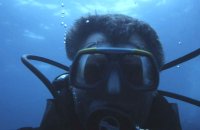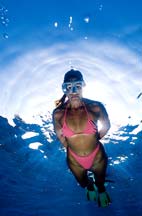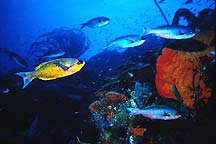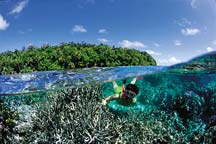 ECOLOGY:
In 2005, our goal is to work on protecting our
coral reefs.
ECOLOGY:
In 2005, our goal is to work on protecting our
coral reefs.
PLANTING
BUOYS IN THE CORAL PARKS OF THE ROSARIES AND
SAN BERNARDO
THE PROBLEM
Daily we saw how innumerable boats and speed
boats arrive at the Park of the Rosary Islands
and San Bernardo with diverse programs: recreation,
diving, snorkeling, tourism etc.
All of these boats drop anchor on the corals,
destroying in seconds what took nature decades
to create.

THE
SOLUTION
This year DIVING PLANET and the FUNDACIÓN
EDUARDOÑO have formed an alliance and
are working to set up at least 12 docking buoys
.
This
system permits the boats and speed boats to
tie up to a buoy that floats above water. They
won’t, then, need to drop anchor and destroy
coral reefs unnecessarily.
IF YOU ARE INTERESTED IN PARTICIPATING OR WOULD
LIKE TO RECEIVE MORE INFORMATION ABOUT THE CORAL
REEFS, PLEASE WRITE US. MOREOVER, IF YOU KNOW
ANYONE OR ANY INSTITUTION THAT WOULD BE INTERESTED
IN MAKING A CONTRIBUTION TO HELP SAVE THE CORAL
REEFS, PLEASE ESCRÍBENOS.
MONTHLY
ACTIVITIES
 THE
DIVING PLANET CLUB is designed for all people
who are divers or who would like to be divers.
In the Diving Planet Club, you will have the
opportunity to participate in exciting, fun,
and safe activities in an underwater, recreational
diving environment. Moreover, you can participate
in special activities and promotions exclusive
to those who belong to The Diving Planet Club.
THE
DIVING PLANET CLUB is designed for all people
who are divers or who would like to be divers.
In the Diving Planet Club, you will have the
opportunity to participate in exciting, fun,
and safe activities in an underwater, recreational
diving environment. Moreover, you can participate
in special activities and promotions exclusive
to those who belong to The Diving Planet Club.
COURSES
From now on, you can plan your courses without
problems. In DIVING PLANET you can enroll in
diving courses ever 15 days.
EXCURSIONS
IN THE FIRST HALF OF 2005
We have already planned our diverse world and
Colombian destinations for the 2nd half of 2005.
Enter in “Trips”
in our Website and get more information about
each one of our trips:
- Los Roques.
- Providencia.
- San Andrés.
- Nuquí.
- Egipto y el Mar Rojo
- Malpelo
GREAT
EQUIPMENT FAIR IN FEBRUARY
There is nothing better than diving with your
own equipment. For this, and the ability to
obtain the best equipment at cost during all
year, in February of 2005, we will have the
second fair of equipment sales for Internet.
Prepare yourself to receive more information.
PERMANENT
BUBBLES PLAN
 The
supermarkets accumulate points .. we accumulate
bubbles!
The
supermarkets accumulate points .. we accumulate
bubbles!
Diving is an experience to share with your friends,
acquaintances, and family members. For each
person who comes to take a diving course at
Diving Planet under your recommendation, you
will receive one bubble. Each bubble is worth
$15.000,00.that you can turn into cash for equipment,
excursions, and other diving courses.
If you think that you have people within your
company who would be interested in diving, we
will work to sell the diving plans and you will
get the bubbles!!!
PERMANENT
COUPLE PLAN
Diving
is an activity that is ideal for those “unforgettable”
moments. If your partner doesn’t dive,
DIVING PLANET will give you a $100.000 bonus
so that you can give it to your partner.

RAFFLE
OF A TRIP TO CARTAGENA WITH ALL COSTS INCLUDED
When you receive your certificate, you will
automatically be included in the raffle that
we will do. You might win an underwater cleaning
trip to the Rosary Islands in the second half
of 2005.
DID
YOU KNOW ...
 Corals,
hydras, jellyfish, and sea anemones are all
part of a group of aquatic invertebrates that
belong to the filo Cnidria. Their bodies, formed
by a closed tube in one extreme presenting radial
symmetry, can look like a bell like the jellyfish
who swim freely or the polipos who adhere (unmoving)
to a hard surface. All have tentacles around
the mouth and identifying urticantes known as
cnibdioblastos.
Corals,
hydras, jellyfish, and sea anemones are all
part of a group of aquatic invertebrates that
belong to the filo Cnidria. Their bodies, formed
by a closed tube in one extreme presenting radial
symmetry, can look like a bell like the jellyfish
who swim freely or the polipos who adhere (unmoving)
to a hard surface. All have tentacles around
the mouth and identifying urticantes known as
cnibdioblastos.
The
coral polyp is practically reduced to a hollow
muscular sack with its mouth – the tip
– surrounded by a crown of tentacles.
A group of corals denominated hermatipicos,
hard or rocky, generally associate with zooxentela
algae which allows them to produce a great quantity
of calcium carbonate that, when solidified and
accumulates, ends up constructing monumental
structures that are known as coral reefs.

Another group, the ahematipicos or bland corals,
live in deeper waters and don’t associate
with algaes and don’t form reefs.








![]() BUCEO
EN COLOMBIA - TURISMO EN COLOMBIA
BUCEO
EN COLOMBIA - TURISMO EN COLOMBIA




